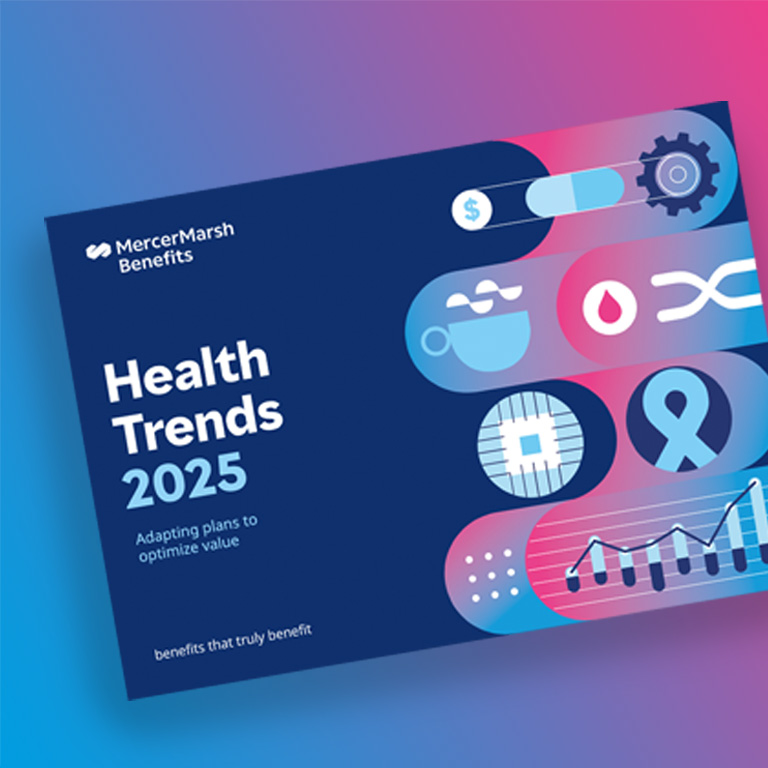
Nicole Cohen
Global Advice and Solutions Team, MMB
-
United States
We found that, although COVID-19 continues to influence health plans, the healthcare environment across the globe has largely stabilised to approximate pre-pandemic rates.
Meanwhile, market innovation continues to deliver new opportunities that employers can take advantage of as they modernise their benefits plans.
Read on for the five key findings from our research. And be sure to address these issues as part of your 2023 benefits program strategy to help protect and promote your employees’ well-being of your employees.
68% of insurers expect plan sponsors to prioritise improvements. This is despite the fact that double-digit medical cost increases are forecast for some markets.
In 2021, insurers generally saw medical trend rates return to pre-pandemic (2019) levels. Most insurers, however, expect medical trend rates to exceed 2019 levels in 2022 and 2023, driven by factors such as increased cost of medical care, increased utilisation, and later-stage diagnosis of illness (which typically requires more costly treatment).
Soaring inflation rates in the general economy have been a source of concern for individuals and employers alike, with low-paid workers hit particularly hard. As employers plan their 2023 benefits offerings (including their medical insurance and well-being programs), the impact of inflation should be an important factor in any decision making.
Plan sponsors should consider factoring the predicted cost increases into budgets. They should determine how to balance empathy with economics as they make decisions regarding the design of their plans. Moving forward, the affordability of coverage and care for employers and employees alike should be a critical factor.
55% of insurers report an increase in the later-stage diagnosis of illness due to deferred care.
COVID-19 continues to impact medical insurance claims, even though public life has reopened in most regions.
Lockdowns and infection fears during the height of the pandemic meant that the medical diagnosis and treatment of many conditions was disrupted. The aftereffects of those delays are still being felt and are having an impact on both the volume and costs of claims in 2022. Globally, more than three in every five insurers (61%) say that claims patterns have changed in 2022, and 55% report seeing more later-stage illness diagnoses. The cost of COVID-19 claims continues to be a significant factor in Latin America and Caribbean (LAC), but this issue has become less prominent in all other regions.
Globally, and in every region except the Middle East and Africa (MEA), insurers reported cancer as the top cause of claim costs in 2021. Cancer was also one of the three most frequent causes of claims. Insurers are reporting that deferred care and diagnosis has increased the volume of claims, with more diagnoses being made at a later stage, which has further driving up costs.
As medical services return to normal in many regions, employers should consider promoting the importance of early diagnosis and regular screenings, especially for cancer.
In order to make coverage more inclusive for those who identify as LGBTQ+, one in two insurers have changed or expect to change eligibility requirements and eligible expenses.
While COVID-19 has had significant short- and long-term impacts on people’s lives, it has also driven innovation amongst insurers and spurred them on to modernise the plans they provide.
This is most evident in the increasing prevalence of new digital tools and services that support well-being and diagnostics. In particular, telehealth services, such as video chats with physicians, have become an essential part of many insurers’ offerings.
However, while digital health support is rapidly evolving, there has been limited progress on health sustainability. Insurers’ future plans show that although some are making changes to their policies and operations that reflect shifts in workplace practices, attitudes and demographics, such change is not universal.
Social factors, such as the additional day-to-day costs associated with treatment, can have a material effect on an individual’s ability to make a full recovery. However, the majority of insurers are not considering any changes to policies that might help. Such changes might include incorporating housing, transportation and food into the case management or rehabilitation package, or providing travel benefits that could improve claimants’ overall health or access to treatment.
Employers should consider assessing whether their programs are inclusive and meet the needs of the entire insured workforce. They should ask, for example, if their programs reflect the needs of lower-paid workers.
16% of insurers report not providing plans that cover mental health services (versus 26% in 2022).
In 2021, mental health conditions were one of the top five causes of claim costs in Europe. This was the first time MMB had seen this as a top-five issue in any region. However, despite progress, many plans continue to exclude mental health care or provide only minimal coverage.
For instance, although two-thirds of insurers globally say they cover psychological and/or psychiatric counselling sessions, in practice, two-thirds of insurers surveyed only cover 10 sessions or fewer. Assuming one session per week, this means plans only cover around 20% of the treatments that would be needed over a year, which will be insufficient for many claimants.
Employers should consider how they can fill the mental healthcare gap in other ways. They need to evaluate the levels of coverage they provide for mental health support, especially counselling sessions, to make sure they meet the needs of employees and their dependents.
More than one in five insurers in Asia are adjusting their medical plan premiums based on an individual’s COVID-19 vaccination status.
Although the projected medical trends for 2023 are close to 2022 levels, there is considerable uncertainty about what the future holds. Around half of insurers globally have not automatically adjusted deductibles (excesses) and co-payments in line with inflation and have no plans to do so at present. Therefore, it’s important for employers to work proactively with their advisors to ensure that certain plan design features are kept in line with inflation.
Globally, around one in every five insurers have made changes to their underwriting requirements due to COVID-19. There are notable differences at the regional level, with insurers in Asia putting more emphasis on altering premiums and exclusions based on vaccination status (compared to other regions).
Benefits managers need to develop strategies that are more robust. They should also prepare for more complex underwriting and plan design challenges.
Insurers have a key role in shaping the future of employee benefits. This is due to factors such as the expert practices they employ, the policy language they use, their flexibility, their willingness to innovate, and their access to large pools of claims data.
This means that the findings from the insurance sector highlighted above will be invaluable for employers who want to design and deliver healthcare plans that meet the needs of their businesses and employees.
To learn more about our findings, download the full MMB Health Trends 2023 research here.

Global Advice and Solutions Team, MMB
United States

Multination Client Director, MMB

Article
13/10/2024